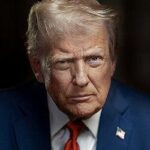Title: Revisiting America’s Troubled Legacy of Intervention in Latin America
In the midst of rising political tensions in the United States, former President Donald Trump has reignited a contentious debate regarding U.S. involvement in Latin America. His statements and policies resonate with a long-standing history of American intervention characterized by a blend of support and suppression, autonomy and control. From Cold War-era coups to contemporary issues surrounding immigration and border security, the narrative surrounding U.S. ‘policing’ in Latin America illustrates an ongoing cycle of influence that continues to shape relations between these regions. As Trump pushes for stringent measures on crime and immigration, critics contend that his approach risks repeating historical errors while jeopardizing decades of diplomatic progress within a region often viewed through a paternalistic lens. This article delves into how current policies reflect past interventions, their implications for Latin American countries, and potential repercussions for future U.S. foreign relations.
Unpacking the Historical Context of U.S. Intervention in Latin America
The roots of U.S. interventionism in Latin America can be traced back to the early 19th century when the Monroe Doctrine established an influential policy over the Western Hemisphere. This doctrine conveyed a clear warning: any European interference within the Americas would be perceived as a threat to national security interests in the United States. Over time, this policy evolved into what was termed “Big Stick” diplomacy under Theodore Roosevelt, which rationalized military interventions across various nations within Latin America under claims aimed at stabilizing these regions but often resulted instead in imposing American will—leading to enduring consequences.
Throughout much of the 20th century, this trend persisted as covert operations and military actions were executed against countries such as Cuba, Guatemala, and Chile—often justified by Cold War dynamics aimed at curtailing communism while disregarding local sovereignty and autonomy. The impact left by these interventions can be summarized through several critical points:
- Overthrowing Governments: The U.S.’s backing led to coups against democratically elected leaders.
- Military Support: Aid provided to oppressive regimes allowed them to maintain power.
- Cultural Disruption: Long-lasting effects on local economies and societal structures.
This intricate history serves as context for evaluating current policies that not only risk repeating past mistakes but also highlight ongoing repercussions felt throughout today’s region.
Examining Trump’s Policing Strategies and Their Consequences for Regional Stability
The policing strategies adopted during Trump’s presidency have faced considerable criticism due primarily to their potential impact on regional stability across Latin America. Under his administration’s aggressive posture marked by increased militarization along borders alongside intensified immigration enforcement efforts—and often neglecting nuanced diplomatic approaches—these tactics echo historical patterns where interventions framed as restoring order frequently escalated tensions instead.
By bolstering border security initiatives, coupled with support for controversial governments under claims aimed at reducing violence levels—the administration mirrored historical practices that historically undermined democratic institutions while deepening social divides throughout affected nations.
The fallout from these strategies has manifested various consequences threatening stability within targeted nations themselves; increasing backing towards authoritarian practices seen recently in Honduras or El Salvador has exacerbated discontent alongside economic inequality—prompting waves of migrants seeking refuge within U.S borders.
Such cycles illustrate how interventionist policies overshadow root causes behind instability—including factors like widespread corruption, socioeconomic disparity, or systemic inequality—which ultimately perpetuate rather than resolve conflicts.
Analyzing these outcomes reveals strategic miscalculations where immediate enforcement measures took precedence over sustainable diplomatic solutions further entrenching legacies steeped deeply into conflict across parts of Latin America.
| Tactics Employed | Potential Outcomes Observed | ||||
|---|---|---|---|---|---|
| Miltarization Along Borders strong> | < Heightened tensions observed along US-Mexico border td > tr > << tr > << td >< strong > Backing Authoritarian Regimes< / strong > td > << td > Erosion witnessed among democratic institutions< / td > tr > << tr > << td >< strong > Focus On Immigration Enforcement< / strong > td > << td > Surge experienced regarding migrant flows leading humanitarian crises< / td > tr > tbody > table > Envisioning A Reformed Approach To US-Latin American Relations For Sustainable PeaceThe longstanding trend toward interventionist foreign policy concerning Latin America has frequently resulted not only instability but also hindered sustainable development efforts over decades gone by; thus necessitating an innovative multifaceted strategy prioritizingdiplomacy , trade ,and cultural exchangeto cultivate authentic partnerships moving forward .This new approach should encompass : p >
A commitment towards collaborative models necessitates accountability transparency amongst all stakeholders involved shifting conversations away unilateral actions towards equity mutual respect defining success metrics beyond mere military presence evaluating progress social indicators such as : p>
|









